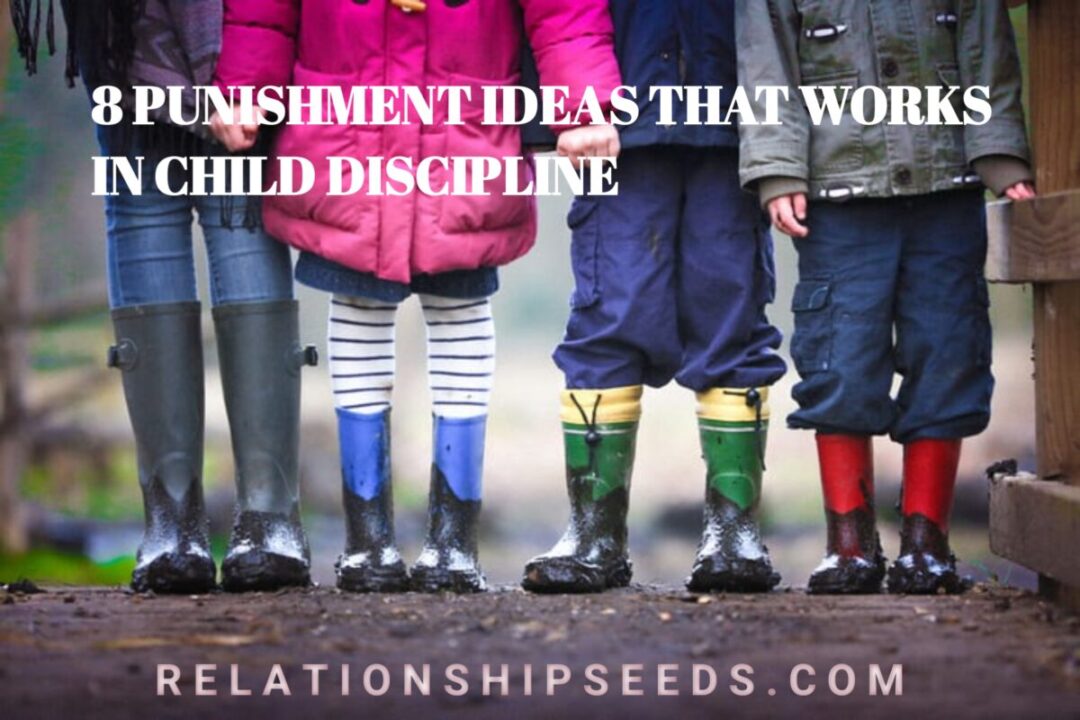Parenting tips
8 PUNISHMENT IDEAS THAT WORKS IN CHILD DISCIPLINE

Last Updated on May 18, 2024 by Joshua Isibor
We’ll be talking about some punishment ideas that work in child discipline. Disciplining your child can be fun if done in creative ways. As a parent, you must have different strategies that will help correct dysfunctional behaviour in your child. Your child must not be familiar with your discipline strategies because familiarity breeds contempt. As a parent, you must be able to shake things up a little.
Do not be afraid to punish appropriately, or your child will spoil rotten with inappropriate characters. Teach your child to understand that there is a consequence for every disobedience, but your punishment should be devoid of yelling spanking, and verbal abuse. Otherwise, you end up hurting your child physically or emotionally.
In my previous post, I talked about how to discipline your child. I was able to identify the steps a parent must take before disciplining a child. Remember, you must connect before you correct your child. You can check it out here.
I will be mentioning ten punishments to use that are harmless but effective. I must mention that these strategies are not strict. Thus you can adjust it as you go. It can be used for children between the ages of 3 to 10.
So let’s delve right into it.
8 Punishments ideas that work in child discipline (how to punish your child)
1. Exercise:
yes, this one works for your overly active children. I remember my teaching days. I had some students who just can’t sit still, so I intentionally gave them punishments to get them on their feet. At first, they call it fun until they want to stop, and I tell them they cannot. This is where the punishment comes in. So if you have an overly active child, then EXERCISE is an effective punishment. The exercise could be pacing, jogging, or even racing.
2. Apology letter:
this is when you make your child write the same words over and over again. It could be, ‘I am sorry, Mom, and I won’t do it again.’ Your child can write and paste it in and around the house as a reminder or fill a notebook. This punishment also corrects your child’s psychology. It makes him/her understand that apologizing when you disobey is important.
3. Role switching:
When your child disorganizes the house or messes up his/her clothes, or the dishes, then you can apply role switching. In role switching, you make your child do your chores in the house. Your child either does the dishes or the laundry. This is expected to be a fun learning process for your child. Using this strategy helps your child understand that doing chores is not an easy task.
4. Book reading:
I love this punishment, and it is just perfect if you have a child who prefers TV to homework. Find an age-appropriate storybook and give it to your child to read until he/she finishes it. Ensure you give him an interesting book. This will work better on weekends. He/she will not be allowed to play until the book is finished. Your child will gradually develop a reading culture with this strategy.
5. Punishment Jar:
I personally like this one. Discuss with your child and come up with a list of creative punishments. Next, write down these punishments on pieces of paper and put them in a jar. The next time your child behaves in an ill manner, ask him to pick a chit from the punishment jar and do whatever is written. These punishments should help children learn something new or utilize their time better.
6. Replace TV shows and cartoons with educational shows:
doing this will help your child focus. Naturally, children despise educational shows. After school, they don’t want to be bothered with academic work. So if you have that child who sits in front of TV shows and ignores chores, declare a week-long educational shows activity.
7. Learn new skills:
if you have a child who delights in jumping around, you can make him/her join you in the kitchen or do laundry. Or if you have a child who doesn’t know how to maximize his/her time, you can help him/her acquire new skills, thus instilling time management. Learning new skills can help redirect your child’s energy.
8. Gradually take away benefits:
if you have a child who is careless and loses books, food packs, and socks, among others then, you should apply this strategy. Gradually take away his/her toys or gadgets. Children do not lose what they love. So as a parent for every loss of books, socks, or food pack, take away a toy or technology. This will help your child learn accountability.
Remember that these strategies are not to be followed strictly. The punishment you apply depends on your child and his/her behaviour. You must also ensure that you state the rules from the beginning for your child. This will reveal that you are a fair and loving parent. Cheers to a creative parent.
ALSO, READ 16 Ways to Improve Parent-Child Relationship
Originally posted 2020-06-15 21:17:54.


-



 Text Messages5 months ago
Text Messages5 months agoBEST LOVE CONFESSION MESSAGES FOR HER OR HIM
-



 Sex Education3 months ago
Sex Education3 months ago10 Simple Hack to Make a Girl Send Her Nudes
-



 Text Messages5 months ago
Text Messages5 months agoHeart Touching RIP Uncle Quotes
-



 Text Messages5 months ago
Text Messages5 months agoBest Good Luck Wishes Before and After Surgery, for Family and Friends
-



 Text Messages6 months ago
Text Messages6 months agoFreaky and Dirty Paragraphs For Him Copy And Paste Yahoo
-



 Uncategorized3 months ago
Uncategorized3 months agoHOW TO FALL IN LOVE WITH YOURSELF
-



 Uncategorized4 months ago
Uncategorized4 months agoHOW TO KISS A BOY FOR THE FIRST TIME
-



 Health5 months ago
Health5 months ago5 Unknown Ways To Maintain Skin Health